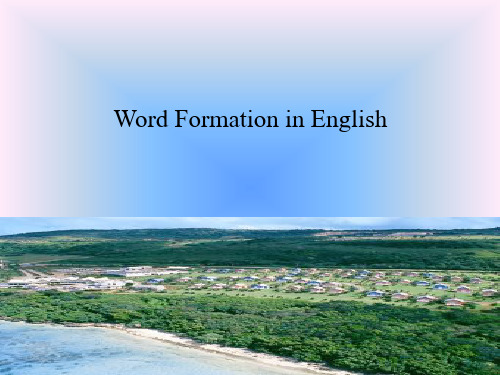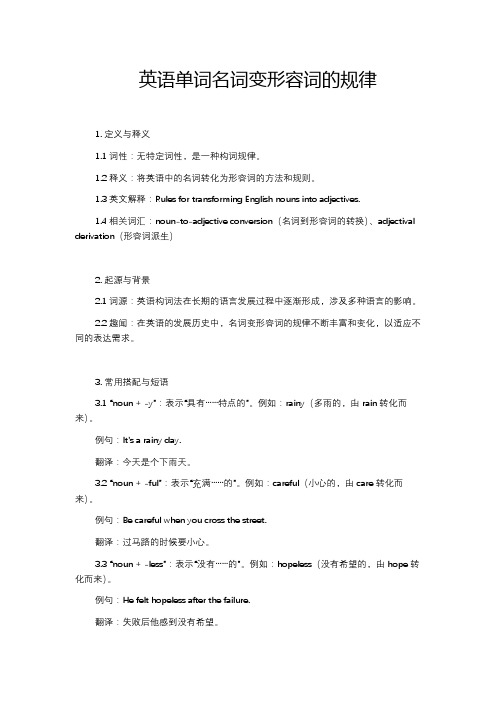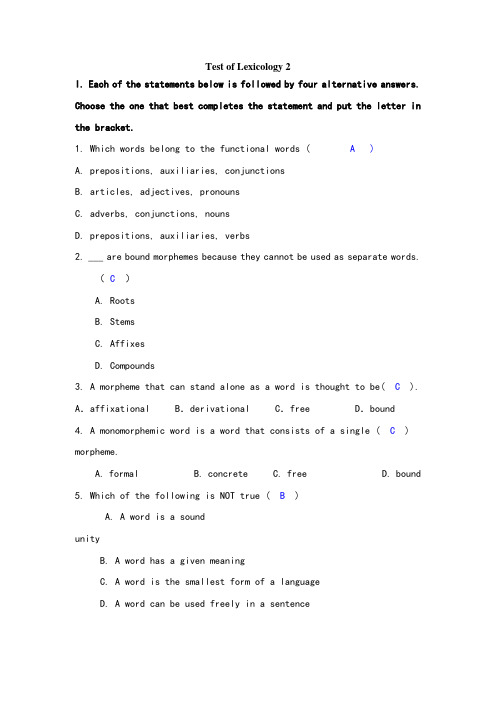de-adjectival-nouns
词汇学论文,浅谈英语构词法,英文版

OnWordFormation★PrefaceLearnalanguage;youmustlearnpronunciation,grammar,vocabulary.Amongthethreef actors,vocabularyhasaveryimportantroleinyourlanguage-studying.AfamousscholarW ilkinssaid”withoutgrammar,verylittlecanbeconveyed,withoutvocabulary,nothingc anbeconveyed.”H eemphasizedthatinmostcases,thevocabularyismoreimportantthangr ammar.AnotherfamouslexicologistMcCarthysaid,whenastudentlearnthesecondlanguag e,nomatterhowwellthestudentlearnsgrammar,nomatterhowsuccessfullyhemastersthes econdsofaL2,withoutwordstoexpressawiderangeofmeanings,communicationinthatlanguagecannotha ppeninanymanfulway.Fromthesetwoexamplesandofcourseincludemanyothercasesthatarenotmentionedher enow,wecanconcludethatifyoudon’tcarevocabularyatall,itisimpossibletolearnala nguageinsomeway.What’smore,youcannotexpressyourrealfeelingnomatteryouarehapp y,sad,fortune,oryouareunlucky,becauseyoudon’tknowwhatwordsyoucansayoryoucanw rite.Today,IwilltellyouwhatIhadlearnedinthisclass.WhatIwillteachyouis“wordform ation”,whydoIchoosethistopictotalkBecauseinmyopinion,ifyouknowthewordformati onverywell,youcanrememberandusethenewwordseasily.Absolutely,it’sveryhelpfulf oryourlanguagestudying.D on’t youthinkso★SummaryEnglishvocabularyhasseveralof Word-formationmethods.Butthethreegreatestwordformatio npowersareaffixation,compounding,andconversion.Theothersixkindsofword-formationmethods includeblending,clipping,acronymy,back-formation,soundreduplication,andcommunizationofpr opernames.★KeywordsMorphemes,classifying,word-formation★ContextBeforetalkingaboutwordformation,maybeweshouldknowthemorphologicalstructureofEngli shwordsfirst.SowhatwewilldiscussnextismorphologicalstructureofEnglishwords.Itincludesmorph emes,morphsandallomorphs,classifyingmorphemes,identifyingmorphemes,morphemesandwor d-formation.☆morphemesTraditionally,wordsareusuallytreatedasthebasicandminimalunitsofalanguageto makesentence,whicharecombinationsofwordsaccordingtosyntacticrules.Structurall y,however,awordisnotthesmallestunitbecausemanywordscanbeseparatedintoevensmal lermeaningfulunits.Theseminimalmeaningfulunitsareknownasmorphemes.Inviewofword-formation,themorphemeisseenas‘thesmallestfunctioningunitinthecompositionof words’.Syn tactically,however,amorphemeistheminimalformofgrammaticalanalysis.Morphemesareabstractunits,whicharerealizedinspeechbydiscreteunitsknownasmo rphs.Theyareactualspoken,minimalcarriersofmeaning.Morphemesvaryinfunction.Accordingly,wecanclassifymorphemesintoseveralgener alcategories:①FreeversusBoundMorphemes----morphemeswhichareindependentofothermorphemes arefree.Thesemorphemeshavecompletemeaningsinthemselvesandcanbeusedasfreegramm aticalunitsinsentences.Morphemeswhichcannotoccurasseparatewordsarebound.Theya resonamedbecausetheyareboundtoothermorphemestoformwordsortoperformaparticular grammaticalfunction.②DerivationalversusInflectionalMorphemes----morphemeswhichareusedtoderive newwordsareknownasderivationalmorphemesbecausewhenthesemorphemesareconjoined, newwordsarederived.③ContentversusGrammaticalMorphemes----Onasemanticandsyntacticbasis,morphe mescanfallintocontentandgrammaticalmorphemes.Contentmorphemesarelexicalmorphe meswhichareusedasweseeabovetoderivenewwords,soalsoknownasderivationalmorpheme s.☆MorphemesandWord-formationWeknowthatwordscanbeanalyzedintomorphemes,whicharetheminimalmeaningfulunit sinthecompositionofwords.Inword-formationformation,however,morphemesareconven tionallylabeledroot,stem,baseandaffix.Affixesareformsthatareattachedtowordsorelementstomodifymeaningorfunction.A ffixesareboundmorphemesbecausenoneofthemcanstandaswordsintheirownright.Accord ingtothefunctionsofaffixes,wecandividethemintoinflectionalaffixesandderivatio nalaffixes.Derivationalandinflectionalaffixesareidenticalwithderivationalandi nflectionalmorphemes.Inviewoftheirdistributionintheformationofword,affixescan fallintoprefixandsuffix.Beforewebeginouractualdiscussionofword-buildingprocesses,therearesomebasic conceptsthatneedclarifying:1.Root:arootisthebasicformofawordwhichcannotbefurtheranalyzedwithouttotallossofidentity.2.Stem:astemmayconsistofasinglerootmorphemeoroftworootmorphemes.Itcanbearootmorphemeplusoneormoreaffixationalmorphemes.3.Base:abaseisreferredtoaformtowhichaffixesofanykindcanbeadded.Itcanbearootorastem.☆ WordFormationTheexpansionofvocabularyinmodernEnglishdependschieflyonwordformation.There isavarietyofmeansbeingatworknow.Themostproductiveareaffixation,compoundingand conversion.⑴AffixationAffixationisgenerallydefinedastheformationofwordsbyaddingword-formingorder ivationalaffixestobase.Thisprocessisalsoknownasderivation,bywhichnewwordsared erivedfromoldorbaseforms.Thewordscreatedinthiswayarecalledderivatives.Accordi ngtothepositionsaffixesoccupyinwords,affixationfallsintotwosubcategories:prefixationandsuffixation.Prefixation includes:NegativePrefixes(a-,dis-,in-,non-,un-…)ReversativeorPrivativePrefixes(de-,dis-,un,…)PejorativePrefixes(mal-,mis-,pseudo-…)PrefixesofDegreeorSize(arch-,co-,extra-,hyper-,macro-,micro-,mini-,out-,over-,sub-,super-,sur-,ultra-,under-…) PrefixesofOrientationandAttitude(anti-,contra-,counter-,pro-…)LocativePrefixes(fore-,inter-,intra-,super-,tele-,trans-…)PrefixesofTimeandOrder(ex-,fore-,post-,pre-,re-…)NumberPrefixes(bi-,multi-,semi-,tri-,uni-…)ConversionPrefixes(a-,be-,en-…)MiscellaneousPrefixes(auto-,neo-,pan-,proto-,vice-…)Suffixation includes:Nounsuffixes(denominalnouns,deverbalnouns,de-adjectivenouns,nonandadjecti vesuffixes)Adjectivesuffixes(denominalsuffixes,deverbalsuffixes)Adverbsuffixes(Omitexample)Verbsuffixes(Omitexample)⑵CompoundingCompoundingistheformationofnewwordsbyjoiningtwoormorebases.Wordsworthforme poundscanbewrittensolid,hyphenatedandopen.1.CharacteristicsofcompoundsCompoundshavenoticeablecharacteristicswhichmayinmostcasesdifferentiatethem selvesfromnounphrasesinthefollowingfouraspects:Phonologicalfeatures,semanticfeatures,grammatical,orthographicalfeatures.2.FormationofcompoundsCompoundingcantakeplacewithinanyofthewordclass,buttheproductiveonesarenoun sandadjectivesfollowedbyverbstoamuchlesserextent.Nouncompounds,adjectivecompounds,verbcompounds.⑶ConversionConversionistheformationofnewwordsbyconvertingwordsofoneclasstoanotherclas s.Conversionisgenerallyconsideredtobeaderivationalprocesswherebyanitemisadapt edorconvertedtoanewwordclasswithouttheadditionofanaffix.Hencethenamezero-deri vation.Wordsproducedbyconversionareprimarilynouns,adjectives,andverbs.Conversiontonouns(deverbal,de-adjectival,miscellaneousconversion)Conversiontoverbs(denominal,de-adjectival,miscellaneousconversion)conversiontoadjectives(voicelesstovoicedconsonant,initialtoendstress) theothersixmeansofword-formationincludes:Blending,Clipping,Acronymy,Back-formation,Soundreduplication,Communizationofp ropernames.Becausethewordslimit,thesixword-formationmethodsisnotdetailedintroducedher e.Ifyouareinterestedinthem,pleaserefertothelexicology.Annotation:《英语词汇学教程》张伟友着,《词汇学学习指南》杨春慧着。
denationalized”的词根、基词和词干

词根:de- (表示“相反”、“除去”)基词:nation(表示“国家”)词干:-ize(表示“使成为”、“使具有特性”)1. 词根“de-”是拉丁语中的一个常见词根,表示“相反”、“除去”的意思。
在英语中,它常常用来表示否定、剥夺或相反的意义。
比如:“devalue”(贬值)、“decrease”(减少)、“demolish”(拆毁)等词中都含有该词根。
2. 基词“nation”源于拉丁语“natio”,最初用来指代人们诞辰或居住的地方。
在今天的英语中,它常常指代一个独立的政治实体,即国家。
这个词在政治、历史和社会学等领域都有着重要的意义。
3. 词根“de-”和基词“nation”结合之后,形成了一个新的词语“denationalized”。
根据词根和基词的含义,我们可以推断,“denationalized”可能指代着“除去国家性质”或“使脱离国家关系”的意思。
4. 通过对词根、基词和词干的分析,我们可以更清晰地理解“denationalized”这个词的含义。
它不仅仅是一个简单的词汇,更是由许多语言要素组合而成的复杂符号,蕴含着丰富的内涵和文化背景。
5. 在当今世界,各国之间的关系日益紧密,国际交流与合作日益频繁。
然而,一些国家或地区却出现了“denationalized”的情况,其国家性质受到削弱或丧失,国家主权受到侵犯,对外关系受到挑战。
6. “denationalized”现象的出现,会对相关国家以及国际社会产生一系列影响和挑战。
这种现象需要引起足够重视,各国应该采取行动,协调合作,共同应对“denationalized”带来的挑战和风险。
7. 通过对“denationalized”这个词的词根、基词和词干的分析,可以让我们更加深入地了解其所蕴含的意义和内涵。
这也提醒我们,在探讨复杂问题时,要善于借助语言学知识,从词汇本身出发,理解问题的本质和所涉及的多方面因素。
总结:词根“de-”、“基词“nation”和词干“-ize”在“denationalized”这个词中形成了一种特殊的合成结构,从而赋予了这个词以特定的意义和用法。
3-2 Word Formation in English 英语语言学ppt

freely n. act of falling
Release: v. To allow to go, to set free.
n. releasing or being released.
cover:
put the cover ( something with which to cover things) on the kettle and the water will boil.
Wrench: where is your wrench (spanthe given verb:
divide:
a period marking the divide.
(something that divides, especially watershed between two eras of American history.)
rise:
He sat at the top of a small rise ( an upward slope; small hill).
turn: Take a turn to the right, please. A path full of twists and turns ( a place at which something turns, turns off or turns back.
2) De-adjectival:
This conversion can be explained in terms of a fixed adjective plus noun phrase from which the noun has been ellipted.
词汇学之3种构词法PPT课件

act
argument example revolution
5. Prefixes of attitude (3)
anti
social
national clockwise slavery
5. Prefixes of attitude
prefixes
meaning
examples
co-
prefixes meaning
examples
arch-
supreme
archbishop
superout-
more than surpassing
supermarket outlive
sur-
over
surcharge
sub-
below
subnormal
overunder-
excessive too little
meaning
not, the converse
of
examples unwise
nonessential dishonest informal immature illegal irregular
2. Reversative prefixes (1)
un
pack
wrap
do
dress
2. Reversative prefixes (2)
8.Number prefixes
prefixes
quinqu-, pentahexa-, sex-
meaning five
six
sept-, heptaoctaennea-
seven eight nine
examples
quinquagenarian, pentagon
英语单词名词变形容词的规律

英语单词名词变形容词的规律1. 定义与释义1.1 词性:无特定词性,是一种构词规律。
1.2 释义:将英语中的名词转化为形容词的方法和规则。
1.3 英文解释:Rules for transforming English nouns into adjectives.1.4 相关词汇:noun-to-adjective conversion(名词到形容词的转换)、adjectival derivation(形容词派生)2. 起源与背景2.1 词源:英语构词法在长期的语言发展过程中逐渐形成,涉及多种语言的影响。
2.2 趣闻:在英语的发展历史中,名词变形容词的规律不断丰富和变化,以适应不同的表达需求。
3. 常用搭配与短语3.1 “noun + -y”:表示“具有……特点的”。
例如:rainy(多雨的,由 rain 转化而来)。
例句:It's a rainy day.翻译:今天是个下雨天。
3.2 “noun + -ful”:表示“充满……的”。
例如:careful(小心的,由 care 转化而来)。
例句:Be careful when you cross the street.翻译:过马路的时候要小心。
3.3 “noun + -less”:表示“没有……的”。
例如:hopeless(没有希望的,由 hope 转化而来)。
例句:He felt hopeless after the failure.翻译:失败后他感到没有希望。
4. 实用片段(1). “The sky is cloudy. It looks like it's going to rain.”翻译:天空多云。
看起来要下雨了。
(2). “She is a careful driver. She always obeys the traffic rules.”翻译:她是个小心的司机。
她总是遵守交通规则。
(3). “The desert is waterless. It's very difficult to survive there.”翻译:沙漠里没有水。
lexicology2词汇学练习及答案

Test of Lexicology 2I. Each of the statements below is followed by four alternative answers. Choose the one that best completes the statement and put the letter in the bracket.1. Which words belong to the functional words ( A )A. prepositions, auxiliaries, conjunctionsB. articles, adjectives, pronounsC. adverbs, conjunctions, nounsD. prepositions, auxiliaries, verbs2. ___ are bound morphemes because they cannot be used as separate words.( C )A. RootsB. StemsC. AffixesD. Compounds3. A morpheme that can stand alone as a word is thought to be( C ). A.affixational B.derivational C.free D.bound4. A monomorphemic word is a word that consists of a single ( C ) morpheme.A. formalB. concreteC. freeD. bound5. Which of the following is NOT true ( B )A. A word is a soundunityB. A word has a given meaningC. A word is the smallest form of a languageD. A word can be used freely in a sentence6. The following words have derivational affixes Except________.( D )A.subseaB. prewarC.postwarD. desks7. Which of the following is not a compound ( B )A. swimming poolB. king-heartedC. greenhouseD. International8. The suffix “-tion” is a ____ suffix. ( D )A.adjectiveB. verbC.adverbD. noun9. From the sentenc es “Hand in your papers.” and “She papered the room green.”, we can see such a means of word formation as________. ( C )A.affixationB. compoundingC.conversionD. acronymy10. “mis-“ in “misunderstand” is a ____________ prefix. ( C )A.negative B. pejorative C. reversative D. locative11. Which of the following is not a major word-formation process ( D )A. CompoundingB. DerivationC. ConversionD. Coinage12. “Anti-” in “antihero” means______. ( A )A. “against”B. “unconventional”C. “of or belonging to the hypothetical world of antimatter”D. “not”13. “-able” in “fashionable” is a(an) _____ suffix. ( D )A. denominalB. deadjectivalC. deverbalD. noun-formingII. Complete the following statements with proper words or expressions.1. According to the functions of affixes, we can put them into two groups: inflectional and ____derivational______affixes.2. Bound morphemes include two types: bound root and ___affixes______.3. Words may fall into ___content _____words and functional words by notion.4. Generally, prefixes only modify the ___lexical meaning_____of the stem.5. Sometimes a word may undergo ____multiple______ conversion, which enables it to function as a member of several word-classes.6. Affixation can be subdivided into ____prefixation_________ and ____suffixation________.III. Term explanationpounding Compounding is a word-formation progress consisting ofjoining two or more bases to form a new unit, a compound word.2.Derivation Derivation is generally defined as word-formationprocess by which new words are created by adding a prefix, or suffix, or both, to the base. Derivation may be defined as process of forming new words by the additional of word element, such as prefix, suffix or combining form, to an already existing word.3.Conversion Conversion is a word formation process whereby a word ofa certain word-class is shifted into a word of another word-classwithout the addition of an affix.4.Word-formation rules The rules of word-formation define the scopeand method whereby speakers of a language may create new word.。
英语词汇学引论 术语翻译
Abberbation 缩写;缩略Ablative case 夺格(即第五个或工具格)Absolute synonym 绝对同义词Accusative case 直接宾格Acronym 首字母缩略词Aderbial clause of concession 让步状语从句Affix 词缀Affixation 词缀法Alien 外国词Alliteration 头韵Alphabetical order 字母表顺序Amelioration 进化Analogy 类比Analytic language 分析性语言Anthropomorphic 拟人化的Antonym 反义词Antonymy 翻译关系Approach to 方法Archaism 古词Arbitrary 任意的Argot 黑话Autosemantic 词本身有独立意义的Base 词基Back-formation 逆成法Bilingual 双语的Blend 拼缀词Blending 拼缀法Borrowed word 借词Borrowing 借词Bound morpheme 粘着形位Briton 布立吞人Capitalization 大写Case 格Classical element 古典成分Clipping 缩短法Collocability 词的搭配能力Collocation 词的搭配Colloquialism 口语词Colloquial style 口语语体Combining form 构词成分Complementaries 互补性反义词Complex word 复合词Compound 合成词Compound word 合成词Compounding 合成法Concatenation 连锁型语义演变过程Conjugation 动词变位Connotative meaning 内含意义Context 语境Contraries 相对性反义词Conventional 约定俗成的Converging sound-development 语音发展的一致性Conversion 转类法Conversives 换位性反义词Cosmopolitan character 国际性Dative case 与格(第三格)De-adjectival 由形容词转变而来的Declension 名词、形容词等的变格Degradation of meaning 意义的降格Denizen 外来词Denominal nouns :abstract 纯名词表示抽象意义Denominal nouns :concrete 纯名词表示具体意义Denotative meaning 外延意义Derivative antonym 派生反义词Deterioration 退化Deverbal noun 由动词派生的名词Diachronic approach 历时分析法Diachronic dictionary 历史语言学词典Diachrony 历时分析Dialect 方言Double genitive case 双生格Doublets 两词一组的同义词Elevation of meaning 意义的升格Encyclopaedic dictionary 百科全书词典Entry 词条Etymology 词源学Euphemism 委婉语Euphony 语音的和谐悦耳Existing word 现行的词Exocentric word 离心结构合成词Extension of meaning 意义的扩大Figure of speech 修饰手段Figurative use 比喻用法Foreign element 外来语成分Formal word 书面词Form-word 虚词Free from 自由形式Free morpheme 自由形位Free phrase 自由词组French element 法语成分Full conversion 完全转类法Full word 实词Functional word 虚词Generalization 一般化Genitive case 生格(第二格)General dictionary 一般性词典Glossary 难词Headword 词目Homoform 同语法形式异义词Homograph 同形异音异义词Homonym 同音异义词;同形异义词;同音同形异义词Homonymy 同音、同形、同音同形异义词的研究Homophone 同音异形异义词Hybrid 混合词Hyponym 下意词Hyponymy 上下意关系Idiom 习语Idiomatic phrase 惯用语词组Imperative sentence 祈使句Indo-European family 印欧语系Inflected language 曲折性语言Informal word 口语词Jargon 行话Latin element 拉丁语成分Leveled inflections 曲折变化弱化Linguistic context 语言语境Literal use 字面用法Loan-word借词Locative case 位置格Locative prefix 表示地点的前缀Lost inflections 曲折变化消失Main stress 主重音Medium-sized dictionary 中型词典Metaphor隐喻Middle English 中古英语Miscellaneous prefix 混合型前缀Monosemy 一词单意Morpheme 形位Morphology 词法Motivation 理据Multilingual 用多种语言表达的;多语的Narrowing of meaning 意义的缩小Native element 本族语成分Native word 本族语词Negative prefix 表示否定的前缀Neo-classical 新古典主义的Neologism 新词New word 新词Nominative case 主格Nonce word 临时造的词Non-linguistic context 非语言语境Notional word 实词Number prefix 表示数目的前缀Obsolete word 费词Official language 官方语言Old English 古英语Onomatopoeia 象声词Open 分开写的Orthographic criterion 正字法标准Part of the speech 词类Partial conversion 部分转类法Pejorative prefix 表示贬义的前缀Pahatic communion 交际性谈话Phonetics 语音学Phonology 音位学Phraseological idiom 熟语Physiology 生理学Pocket dictionary 小型词典Polarity 对立性Polysemic character 一词多义性Polysemy 一词多义Popular 通俗的Possessive case 所有格Preciseness 精确性Prefix 前缀Prefixation 前缀法Private prefix 表示反义的前缀radiation 放射型的语义演变过程reduplicative compound 或者reduplicative(s )重叠合成词reference 语词所指涵义referent 语词所指事物relative synonym 相对同义词repetition 重复representative work 代表作reversative prefix表示反义的前缀rhyme 韵脚richness丰富性root 词根root antonym词根反义词Scandinavian element 斯堪的纳维亚语成分Secondary stress次重音Semantic borrowing(s)义借词Semantics语义学Semiotic triangle三角关系符号学理论Sense-shift语义转换Shade of meaning意义的(细微)差别Shortening缩短法(the)sign theory of Saussure索绪尔符号理论Signified(借助符号进行交际的)事物的概念或涵义Signifier代表事物的概念或涵义符号Simile明喻Slang俚语solid(合成词中两个词)连起来写的special dictionary专门性词典specialization 特殊化Spelling拼写Stem词干Stylistics文体学Suffix后缀Suffixation后缀法(the)superordinate (term)上义词Survival(s)(vestiges)保留下来的词Sychronic approach共时分析法Sychronic dictionary共时语言学词典Synchrony共时分析Synesthetic(产生)联觉的Synecdoche提喻法Synonym同义词Synonymy 同义关系Synsemantic 与其他词连用时才有意义的Teutonic language条顿(日耳曼)语言The Angles,Saxons and Jutes盎格鲁人撒克逊人,朱特人The Norman conquest 诺曼征服英国Translation-loans译借词Triplets三词一组的同义词Unabridged dictionary 大型(无任何删节的)词典Variety (语言的)变体Word-class 词类Word -formation word-building 构词法Word-forming ability 构词能力Word-stock词汇Working language 工作语言。
词汇学复习资料
★1.Lexicology is the study of the structures, origins, meanings and usages of words.★2.A word is a minimal free form of a language that has a given sound and meaning andsyntactic function.★3.Vocabulary refers to the total number of the words in a language. It also stands for allthe words used in a particular historical period, of a given dialect or discipline, or possessed by a person.4.Classification of Words:(1)by use frequency :A .Basic Word Stock(基本词汇)B. Nonbasic V ocabulary(非基本词汇):Terminology 术语/ Jargon行话/ slang 俚语/ argot黑话/ Dialectal words 方言词/Archaism 古语词/ Neologism 新词(2)by notion: Content words and functional words 实义词与功能词(3)by origin: Native words and borrowed words 本族词与外来词5.Indo-European Language Family(印欧语系):Language and Language Families语言和语系•Number of languages in the world:3000-5000•Number of language families in the world:300•Basis for language family grouping:Similarities in the basic word stock and grammar of the languagesThe Indo-European, one of these, is made up of most languages of Europe, the Near East, and India. (English belongs to Germanic , a Western set )1)Eastern Set(东部诸语族):Albanian (阿尔巴尼亚语族)、Balto-Slavic (波罗的海-斯拉夫语族)、Amenian (亚美尼亚语族)、Indu-Iranian (印度-伊朗语族)2)W estern Set (西部诸语族):Germanic (日耳曼语族)、Celtic (凯尔特语族)、Hellenic (古希腊语族)、Italic (意大利语族)6. Three periods of the English language:1)Old English(450AD—1150AD) when the first Germanic tribes began to settle inEngland.a. Anglo-Saxon—the Germanic tribesb. Latin –introduction of Christianity at the end of the 6th century.c. Scandinavian –Norwegian and Danish vikingsd. 5000-6000 words; highly inflected2)Middle English (1150—1500) during the Norman Conquest.a. French influence Norman Conquest 1066b. 9000 French words continually flowed into Englishc. Dutch words entered English with the trade relation.d. English regained position of importance–Wycliff translation of the Bible (威克利夫)–Writings of Chaucer and Langland (乔叟、朗兰)–English gradually came back to schoolsMidland is the chief ancestor of Modern English.3)Modern English (1500—):Early Modern English (1500-1700) 早期现代英语•The Renaissance 文艺复兴—a new upsurge of learning ancient Greek and Roman classics•1500-1700–over 10,000 new words entered English.•The Bourgeois Revolution, the Industrial Revolution, colonization–absorb words from all major languages in the worldLate Modern English (1700-up to now) 后期现代英语•World wars•Advances in science and technology•Thousands and thousands of new words have been created through borrowing and word-formation•New words in all walks of life: politics, economy, commerce, culture, entertainment, education, sports, transportation, mass media•From synthetic language to analytic language7.Modes of Vocabulary Development 词汇的发展方式•C reation 创词– formation of new words by using existing materials such as roots, affixes and other elements.•S emantic changes 旧词新义– an old form which takes on a new meaning to meet the new need.•B orrowing借词—absorbing words from foreign languages★8.Morpheme (词素)1) The minimal meaningful units of language are known as morphemes. 语言的最小意义单位称为词素。
造词法
Affixation加词缀法Prefixation加前缀法; Affixation加后缀法.(1)Prefixation加前缀法Prefixation is to put a prefix in front of the base, usually without a change of word class. ○1negative prefixes:a-,an-“lack, lack of “(aseptic无菌的;anarchy无政府状态)dis-“not, the converse of”(dishonest不诚实的;dislike不喜欢)in-, il-,im-“not, the converse of”(inconsistent不相容的)non-“not”(non-black白人学生,nonperishable不易坏的)un-“not, the converse of” (unfriendly不友好的,unease不安,焦虑)○2reversative or privative prefixes:de-“reversing the action; depriving of” (decentralize分散;denude剥夺)dis-“reversing the action; lacking” (disinfect消毒;discolored变色)un- “reversing the action; depriving of, releasing from, degrading”(untie解开;unleash松开皮带)○3pejorative prefixes:mal-“badly, bad”(maltreat虐待,malodorous有臭味的)mis-“wrongly, astray” (misbehaved举止失礼的,misdoing不端行为)pseudo-“false, imitation” (pseudoscience伪科学)○4prefixes of degree or size:arch- “supreme, most” ( archenemy大敌,arch-dove鸽派首领)co-,com-, col-, cor-“joint, jointly, on equal footing”(coexistence共存,concur同意)hyper- “extreme”(hyperactive极度活跃的,hypersensitive过于敏感)mini-“little”(minibike微型机车,miniskirt迷你裙)out-“surpassing” (outman人数超过,outlive比…长寿)over- “excessive;from above” (overestimate高估,overflow溢出)sub-“below”(subsonic亚音速的,subculture亚文化)super-“more than, very special; on top, hierarchically superior”(supersecret机密,superimpose叠加)sur- “over and above” (surpass超过,surtax附加税)ultra-“extreme, beyond” (ultramodern超现代化的,ultrashort超短波)under- “very little” (underestimate低估)○5prefixes of orientation and attitude:anti-“against” (antisocial反社会的)contra- “opposite, contrasting” (contraindicate禁忌)counter-“against, in opposite to” (counterclaim反诉)pro-“for, on the side of; on behalf of” (pro-student站在学生一边)○6locative prefixes:fore-“front part of, front” (forearm前臂,forehead前额)inter-“between, among”(international国际的)sub-“under” (subconscious潜意识)super-“above” (superstructure上层构造)trans- “across, from one place to another” (transform转变)○7prefixes of time and order:ex-“former” (ex-husband前夫,ex-president前总统)fore-“before” (foretell预言,forenoon上午)post-“after” (post-irradiation 辐射后的)pre-“before” (preschool入学前的,prehistory史前历史)re- “again, back” (redial重拨,rethink再考虑)○8number prefixes:bi-, di-“two” (bimonthly双月刊,diode二极管)multi-, poly-“many” (multi-lingual多语的,polygon多边形)semi-, demi-, hemi-“half” (semicircle半圆, demigod半神,hemiplegia偏瘫)tri-“three” (tripod三脚架,trimester三个月时间)uni-, mono-“one” (uniform制服,monorail单轨铁路)○9miscellaneous neo-classical prefixes:auto-“self” (autobiography自传,autocrat独裁者)extra-“exceptionally” (extrasolar太阳系外的,exralinguistic语言外的)neo-“new, revived” (neo-classism新古典主义,neology新词)paleo-“old, ancient” (paleobotany古植物学,paleozoology古动物学)pan-“all, worldwide” (pan-Americanism泛美主义)proto-“first, original” (protohistory原始学,protohuman原人)tele-“distant” (telegram电报,telescope望远镜)vice-“deputy” (vice-chairman副主席,viceroy总督)10conversion prefixes:○a-(aglow兴奋的,awash漂浮在水面上的)be-“wearing, surrounded by” (bespectacled戴眼镜的)en-, em-“to put into, to provide with” (endanger处在危险中)(2)Suffixation加后缀法:Suffixation is to put a suffix after the base, usually with a change of word class. Chief function of suffixation is to change the word class of the base.○1noun suffixes:A, denominal nouns: abstract(Become largely noncount, abstract or collective nouns of status and activity)-age “measure of, collection of” (mileage里程)-dom “the state of being sth” (kingdom王国,officialdom官员)-ery, -ry“the condition or behavior associated with; location of”(slavery奴隶制,nunnery女修道院,rocketry火箭技术)-ful“the amount contained” (spoonful一匙的量)-hood“the state or time of being sth” (boyhood少年时代)-ing“material of; activity connected with” (carpeting地毯材料)-ism“doctrine of, practice of” (absenteeism矿工,optimism乐天主义)-ocracy“government of” (democracy民主政府)-ship“the state or quality of” (friendship友谊)B, demomial nouns: concrete-eer “skilled in, engaged in” (auctioneer拍卖商)-er“having dominant characteristics, denizen of” (teenager青少年)-ess“a female( of the stated kind)” (actress女演员,lioness雌狮)-ette “compact; imitation; a feminine marker” (dinette小饭厅)-let“small, unimportant of”(piglet小猪)-ling “minor, offspring of” (underling下属)-ster“involved in” (gangster歹徒,gamester赌徒)C, deverbal nouns: (largely of personal reference)-ant“a person or thing” (informant告密者)-er, -or“a person or thing” (teacher老师actor男演员)-age“action of, instance of” (breakage破损)-action“the process or state of; the product of, the institution produced by”(classification分类,foundation创办)-al “the action or result of” (arrival到达)-ing“what results from the action of the base” (opening空隙)-ment“the result of” (arrangement安排)D, de-adjectival nouns: (to form abstract uncountable nouns)-ity“the quality or an example of” (equality平等)-ness“the stated condition, quality or degree” (frankness坦率)-ese“member of (nationality or race); in the language of, in the style of”(Chinese中国人)-(i)an“adherent to; relating to; citizen of; in the language of” (Russian俄国人的) -ist“a person who believes in, is skilled in ,or plays(the musical instrument, ect”(specialist专家)-ite“adherent to, member of; citizen of” (socialite社会名流)○2adjective suffixes:A, denominal suffixes: (form adjectives, esp. from nouns)-ed“having” (pointed尖的)-ful“full of, providing” (successful成功的)-ish“somewhat like; somewhat; approximately; ect.” (foolish愚蠢的)-less “without” (homeless无家可归的)-like “resembling or characteristic of” (ladylike淑女般的)-ly “having the quality of; every” (motherly慈母般的)-y “somewhat like, characterized by” (milky乳白色的)-al, -ial, -ical “having the properties of, having a relation to” (accidental意外的) -esque (Romanesque罗马风格的)-ic, -atic (atomic原子弹的,problematic有疑问的)-ous, -ious (vivacious生气勃勃的)B, deverbal suffixes: (form adjectives from verb)-able “of the kind that can be done” (eatable可食用的)-ive “of the kind that can do sth” (reflective沉思的)○3adverb suffixes:-ly “in a manner; in a respect; in a degree” (personally亲自地)-ward(s)(earthword向地面的onward向前的)-wise (clockwise顺时针方向地)○4verb suffixes: (be added to noun or adjective bases to form transitive verbs)-ate (hyphenate以连字符连接的)-en (deepen加深,tauten使绷紧)-ify (amplify详述,codify变成法典)-ize( -ise)(legalize使合法化,publicize引起公众注意的)。
词汇学总结
Ⅰ。
What is lexicology?The study of words/lexical components of a language.Lexicology is a branch of linguistics concerned with the study of the vocabulary of a given language. It deals with words, their origin, development, structure, formation, meaning and usage.Generally speaking, linguistics can be defined as the scientific study of language. To be more exact, linguistics studies the general principles upon which languages are constructed and operate as systems of human communication Language is a system of arbitrary vocal symbols used for human communication.the definition of a word comprises the following points:A minimal free form of a language A sound unity A unit of meaning A form that can function alone in a sentenceA word is a minimal free form of a language that has a given sound, meaning and syntactic functionWhat is vocabulary①The total number of the words in a language. ②All the words used in a particular historical period③.All the words of a given dialect, a given book, a given discipline and the words possessed by an individual person.①.5 basic features of the basic word stock All national character 全民性 Stability 稳定性 Productivity 能产性 Polysemy 多义性 Collocability 搭配能力强Non-basic vocabulary includes the following:Terminology 专业术语technical terms (formal)Jargon 行话specialized vocabulary in certain professionsSlang 俚语substandard words often used in informal occasions (colloquial)Argot 隐语words used by sub-cultured groups (informal)Dialectal words 方言词only by speakers of the dialect (informal)Archaisms 古语词words no longer in common use or restricted (formal)Neologisms 新词语newly created words with new meaning (formal)②Content words/Notional words/full words/lexical wordsConstitute the main body of the English vocabulary, numerous and the number is ever growingFunctional words/ Grammatical wordsConstitute a very small number of the vocabulary; stable③Native words / Angle-Saxon words Native words are not native in fact but words brought to Britain in the fifth century by the German tribes: the Angles, the Saxons, and the Jutes, thus known as Anglo-Saxon words.Native words are small in number, but form the mainstream of the basic word stock. What is true of the basic word stock is also true of the native words. Besides they are also (1) neutral in style, (2) frequent in use.Borrowed words/ loan words / borrowings Denizens 同化词Aliens 非同化词Translation-loans 译借词Semantic loans 语义借词Ⅱ。
